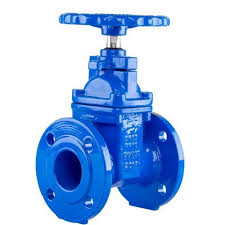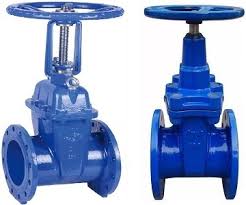Ductile Iron Valves and Cast Iron Valves

The Application of Ductile Iron Valves and Cast Iron Valves
Ductile Iron Valves and Cast Iron Valves are widely used in various industrial applications due to their exceptional durability and corrosion resistance. Features of Cast Iron Gate Valves include superior strength, long-lasting performance, and the ability to withstand high-pressure environments. When it comes to Ductile Iron Pipeline Valve Selection, factors such as flow capacity, pressure ratings, and compatibility with the process media must be carefully considered. Corrosion-Resistant Cast Iron Valve Applications are particularly prevalent in industries like water treatment, chemical processing, and oil and gas, where the valves’ resilience to harsh environments is critical. Renowned manufacturers like Cameron offer a comprehensive range of ductile iron and cast iron valves to meet the diverse needs of industrial customers, ensuring reliable and efficient fluid control solutions.
1 inch valve
wkm valves
What Are The Types Of Ductile Iron Valves and Cast Iron Valves?
Ductile Iron Gate Valves:
Ductile iron gate valves are known for their robust construction, providing reliable shutoff in pipeline systems. They are commonly used in water distribution, wastewater treatment, and industrial process applications.
Ductile Iron Globe Valves:
Ductile iron globe valves offer precise flow control and tight sealing, making them suitable for regulating liquid and gas flow in various industrial settings.
Ductile Iron Ball Valves:
Ductile iron ball valves feature a spherical ball that rotates to regulate flow. They are widely used in oil and gas, chemical processing, and other demanding industries due to their excellent durability and shut-off performance.
Cast Iron Butterfly Valves:
Cast iron butterfly valves are compact, lightweight, and cost-effective solutions for on/off and throttling applications. They are often found in HVAC, water, and wastewater systems.
Cast Iron Check Valves:
Cast iron check valves are designed to prevent backflow, protecting downstream equipment and ensuring unidirectional flow in pipelines. They are common in water, oil, and gas applications.
What Is Ductile Iron Valves and Cast Iron Valves?
Ductile Iron Valves and Cast Iron Valves are two prominent types of industrial valves widely used across various industries. Ductile Iron Valves are known for their exceptional strength, durability, and resistance to corrosion, making them suitable for demanding applications such as water treatment, chemical processing, and oil and gas operations. Cast Iron Valves, on the other hand, are a more affordable option, offering reliable performance in applications like HVAC systems, municipal water distribution, and wastewater management. Both ductile iron and cast iron valves are designed to provide efficient flow control, precise shut-off, and long-lasting service, ensuring the safe and reliable operation of critical industrial infrastructure. The choice between these valve types often depends on factors such as pressure ratings, media compatibility, and the specific requirements of the application.
How to Select the Right Ductile Iron Valves and Cast Iron Valves?
When selecting the appropriate Ductile Iron Valves or Cast Iron Valves for an application, several key factors must be considered. Pressure Ratings are crucial, as the valve must be able to withstand the maximum operating pressure of the system. Flow Characteristics and Capacity are also important, ensuring the valve can handle the required flow rates. Media Compatibility is essential, as the valve materials must be resistant to the corrosive or abrasive properties of the fluid being controlled. Installation Requirements, such as valve size, connection type, and orientation, should also be taken into account. By carefully evaluating these parameters and consulting with experienced valve manufacturers or distributors, users can select the most suitable ductile iron or cast iron valve for their specific application, ensuring reliable and efficient fluid control.
Features of Ductile Iron Valves and Cast Iron Valves
Durability:
Ductile iron and cast iron valves are known for their exceptional durability, able to withstand harsh operating conditions and high-pressure environments.
Corrosion Resistance:
The materials used in the construction of ductile iron and cast iron valves, such as 316 stainless steel, provide excellent resistance to corrosion, ensuring long-lasting performance.
Strength:
Ductile iron valves, in particular, are renowned for their superior strength, making them suitable for applications with high mechanical stress or impact.
Cost-Effectiveness:
Cast iron valves are generally more cost-effective compared to ductile iron, making them a popular choice for budget-conscious projects.
Versatility:
Both ductile iron and cast iron valves are available in a wide range of sizes, pressure ratings, and connection types, allowing for versatile installation in diverse applications.
Low Maintenance:
The robust design and materials used in ductile iron and cast iron valves contribute to their low maintenance requirements, reducing the need for frequent servicing.
Advantages and Disadvantages of Ductile Iron Valves and Cast Iron Valves
Advantages of Ductile Iron Valves:
- Exceptional Strength: Ductile iron valves have a higher tensile strength and impact resistance compared to traditional cast iron, making them suitable for demanding applications.
- Corrosion Resistance: The ductile iron material and coatings used in these valves provide excellent resistance to corrosion, ensuring long service life.
- Reliability: Ductile iron valves are known for their reliable performance and ability to withstand high pressures and temperatures.
Disadvantages of Ductile Iron Valves:
- Higher Cost: Ductile iron valves are generally more expensive than their cast iron counterparts, which may be a concern for budget-conscious projects.
- Weight: Ductile iron valves tend to be heavier than cast iron, which can make installation and handling more challenging.
Advantages of Cast Iron Valves:
- Cost-Effectiveness: Cast iron valves are typically more affordable compared to ductile iron, making them a popular choice for cost-sensitive applications.
- Availability: Cast iron valves are widely available and can be found in a broad range of sizes and configurations.
Disadvantages of Cast Iron Valves:
- Lower Strength: Cast iron valves have lower tensile strength and impact resistance compared to ductile iron, which can limit their use in high-stress applications.
- Corrosion Susceptibility: Cast iron is more susceptible to corrosion than ductile iron, which may reduce the lifespan of the valves in certain environments.

The Specifications of Ductile Iron Valves and Cast Iron Valves
| Specification | Details |
|---|---|
| Type | Ductile Iron Ball Valve |
| Ball Material | 316 Stainless Steel |
| Attachment Type | Flanged |
| Thread Standard | ASME B16.5 |
| Thread Size | 2″ |
| Body Material | Ductile Iron |
| Safe for Use With | Water, Oil, Gas, Chemicals |
| Handle Type | Lever |
| Handle Material | Ductile Iron |
| Maximum Working Pressure (psi) | 285 |
| Maximum Working Pressure (bar) | 20 |
| Operating Pressure | 0-20 bar |
The Installation Steps for Ductile Iron Valves and Cast Iron Valves
Preparation:
- Ensure the pipeline is depressurized and drained before installation.
- Measure the exact dimensions of the valve and the pipe to confirm compatibility.
- Clean the pipe ends and valve flanges/threads to remove any debris or contaminants.
Positioning:
- Determine the correct orientation of the valve based on the flow direction.
- Leave enough clearance around the valve for easy access and future maintenance.
Piping Alignment:
- Align the valve flanges or threads with the corresponding pipe connections.
- Use appropriate gaskets or sealants to ensure a tight, leak-free seal.
Bolting/Threading:
- For flanged valves, tighten the bolts in a star or criss-cross pattern to evenly distribute the load.
- For threaded valves, apply thread sealant and hand-tighten the valve into the pipe fitting.
Actuation:
- For valves with actuators, such as electric or pneumatic, follow the manufacturer’s instructions for proper installation and connection.
Leak Testing:
- Pressurize the system and check for any leaks around the valve body, flanges, or threaded connections.
- Tighten or adjust the valve as needed to eliminate any leaks.
Final Inspection:
- Ensure the valve is operating smoothly and that all connections are secure.
- Document the installation details for future reference.
The Operation Theory of Ductile Iron Valves and Cast Iron Valves
Operation Theory of Ductile Iron Valves and Cast Iron Valves:
- Both ductile iron and cast iron valves rely on the basic principles of fluid dynamics to control the flow of liquids and gases.
- The valve’s key components, such as the ball, gate, or globe, are designed to open and close, restricting or allowing the passage of the fluid through the valve body.
- Precise engineering of the valve’s internal geometry, materials, and sealing mechanisms ensures efficient flow control and minimizes pressure drops.
- Proper maintenance, lubrication, and periodic inspections are crucial for the reliable and long-lasting operation of these valves.
Large Diameter Cast Iron Flange Valves:
- Large diameter cast iron flange valves, typically ranging from 4″ to 48″ in size, are commonly used in municipal and industrial water, wastewater, and process applications.
- These valves feature a robust cast iron body and flanged connections for easy installation in large-scale piping systems.
- They are designed to handle high flow rates and withstand the challenges of heavy-duty service, such as frequent cycling or exposure to abrasive media.
Recommended Cast Iron Valve Brands:
- Mueller: A leading manufacturer of cast iron valves, known for their reliable performance and wide range of products.
- Nibco: Offers a comprehensive selection of cast iron ball, gate, and globe valves for various industrial and commercial applications.
- Watts: Specializes in cast iron valves for water, gas, and HVAC systems, with a focus on quality and innovation.
- Kennedy Valve: Provides a variety of cast iron valves, including resilient-seated gate valves and butterfly valves, for municipal and industrial use.
- AVK: A global provider of high-quality cast iron and ductile iron valves, known for their advanced engineering and attention to safety.
